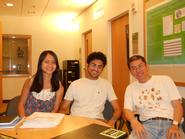
Ichthyopthirius (Ich), a unicellular parasite that attacks freshwater fish and causes “White Spot Disease,” often has deadly consequences for its host, yet there is no effective treatment for the disease. After Ich finds its host, it penetrates the fish epithelium and grows to form visible white spots. During infection, host immunity decreases and extensive growth of Ich on fish’s gills can block oxygen exchange and suffocate the fish. An Ich outbreak could claim as many as 18 million fish, harming aquacultures and economies around the world.
Despite the disease’s prevalence, researchers have no definitive mechanism for Ich’s reproductive cycle, creating an obstacle to finding effective vaccination and treatment. This summer, Chun Yee Lau ’12 and Ravi Jariwala ’13 are working under Assistant Professor of Biology Wei-Jen Chang to discover more about the Ich reproduction cycle.
Observing Ich undergoing sexual reproduction poses difficulties because scientists do not know whether or not Ich reproduces sexually, and if it does, at which stage during the cell cycle. Over the previous academic year, two recent biochemistry graduates completed their senior theses on monitoring expressions of meiosis-specific genes in Ich. Meiosis is a type of cell-division necessary for sexual reproduction, and so expression of meiosis-specific genes would indicate that the organism undergoes conjugation, where exchange of genetic material takes place. However, while the students witnessed a rise and fall in these meiosis genes, it did not appear that meiosis had actually happened. This opens the possibility that the genes in question were not meiosis-specific after all.
Now, Chang’s research group is taking a different approach to Ich’s reproductive cycle. Jariwala and Lau are looking at different sets of genetic markers in search of evidence for sexual conjugation. They are examining 23 cyclin genes in Tetrahymena, a free-living unicellular organism closely related to Ich. Cyclin genes control the cell cycle and by identifying the cyclin genes specifically expressed during sexual conjugation in Tetrahymena, Chang’s group hopes to find homologues of these genes in Ich and monitor their expression level. Lau has found that Ich has homologs of all 23 cyclins, providing some evidence for conjugation. However, this finding still needs to be verified experimentally because similar genes could have different functions in different organisms.
While Lau focuses on cyclin genes, Jariwala is exploring new sets of genes related to sexual conjugation in Tetrahymena and Paramecium. Both Tetrahymena and Paramecium sexual reproduction involves the use of small RNA. Identifying the small RNA pathway in Ich could have unlocked more sets of genes to explore.
Both students have experience working or volunteering in biology labs over the academic year. Lau has worked specifically with Ich, and Jariwala has taken parasitology at Hamilton. As biology majors, both were interested in pursuing the topic further. They look forward to learning new programs and lab techniques, and Lau hopes to continue this work for her senior thesis.
Jariwala is interested in music, and he enjoys playing guitar and volunteering in his free time. Lau is involved in the Hamilton Association for Volunteering, Outreach and Charity (HAVOC), and works at Café Opus and as an usher at Wellin Hall.
Ich poses a serious threat to freshwater species, killing off thousands of fish every year. By researching this parasite’s reproductive capabilities, researchers get one step closer to treating this disease.
Ravi Jariwala is a graduate of Indian Springs School in Pelham, Ala. Chun Yee Lau is a graduate of John Dewey High School in Brooklyn, N.Y.
Posted August 2, 2011
